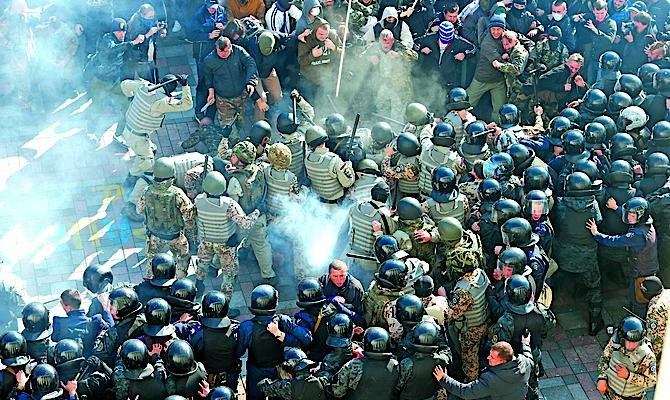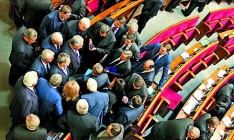Politics
ManeuversDeputies made amendments to the anti-corruption laws prior to voting

The Verkhovna Rada passed the laws on the Prosecutor General’s Office and the Anti-corruption Bureau appended with amendments to the text. In this way, the powers that be decided to refute the strengthening of advocacy and make the anti-corruption bureau more dependent on politicians.
Prosecutor’s office awaits downsizing
Prior to the start of yesterday’s session of the Verkhovna Rada a number of non-government organizations and the Svoboda party announced widespread protests in front of the parliament dedicated to the anniversary of the formation of the Ukrainian Insurgent Army. When deputies came to work they were greeted by a small throng of activists, while the majority of the protestors showed up late.
Taking advantage of the temporary absence of pressure on the street, deputies managed to vote for the anti-corruption bills that the Cabinet of Ministers and President Petro Poroshenko insisted on literally in an hour. The deputies also confirmed the new minister of defense. The president appeared in the parliament to control the voting. As a result, all documents were approved with a sufficient number of votes.
“As it turns out after its dismissal the parliament is working like a well oiled machine, though there were fears that the deputies might sabotage its work. The latest events showed that any laws can be passed and any agreements can be reached,” people’s deputy of the Sovereign European Ukraine party Yuriy Blahodyr told Capital.
A source of Capital in the UDAR party said the agreement to vote for the said package of laws was reached earlier between the leaders of factions and the president. “We agreed to a compromise with Batkivshchyna on the issue of voting for the law On the Prosecutor General’s Office, which it insisted upon,” he said.
As a reminder, the bill On the Prosecutor General’s Office was submitted to the Verkhovna Rada a year ago and was considered one of the main documents regarding Euro-integration. In November it was even passed in its first reading, but later was temporarily shelved. The other day it garnered the constitutional number of votes of support.
According to information that Capital has, more than 80 amendments were made to the bill. “A part of the norms on strengthening the prosecutor’s office were deleted from the bill prior to its second reading. In this way the government has once again proved that it is customary to speak about empowerment of the prosecutors while being in the opposition”, President of the Association of Lawyers of Ukraine Denys Buhai, who positively assesses the law in its entirety, told Capital.
He said the pluses of the law are the liquidation of the functions of general oversight, which was often exploited by the prosecutor’s office to apply pressure on businesses. “The positive changes include the implementation of the self-administration of the prosecutor’s office, enhanced independence of a prosecutor from his superior, settlement of issues of career growth and improvement of the system of disciplinary responsibility of the prosecutor’s office (i.e. making the violator of the law accountable),” says Buhai. The law also calls for holding an annual clandestine review of the decency of the prosecutor’s office. Basically, this means the legalization of provocation to take bribes.
However, Assistant Prosecutor General Oleksiy Bahanets believes the easing of control of high-ranking managers over prosecutors is erroneous. He also criticized the norm on the election of prosecutors in oblasts by the local councils. “For instance, if the governor is not satisfied with the head of the oblast prosecutor’s office, he may try to push for his re-election by the council of prosecutors,” Bahanets told Capital.
Deputies gave themselves certain additional rights
Chair of the Committee on the Fight against Organized Crime Viktor Chumak told Capital that the preparation of the law on the National Bureau of Anti-corruption Investigation for the second reading lasted into the early hours of the morning. As a result, the document underwent fundamental changes. For example, the VR was granted the right to raise the issue of dismissal of the director of the bureau, though earlier it did not have influence on the functioning of this body. Now, 130 voices of parliamentarians will be sufficient to put forth the issue of dismissal of the head of the body responsible for the fight against corruption.
In addition, the clause that prohibited recent employees of law enforcement bodies to work for the bureau was rescinded and the qualification requirements of the director of the bureau were toughened. The Center of Counteracting Corruption says the initiators of the amendments are people’s deputies Serhiy Pashynskiy (Batkivshchyna) and Rostyslav Pavlenko (UDAR) and that they led the bureau to political dependence.
VR deputies considered yet another amendment prior to voting. The changes initiated by people’s deputies Serhiy Vlasenko (Batkivshchyna) and Yuriy Voropayev (Party of Regions) presume that in order to conduct any procedural acts the Anti-corruption Bureau will have to obtain a permission of a court of law. “The matter is about the possibility of access to premises, besides residential ones, conducting confiscation of documents and blocking of cash tills of companies for 10 days. I believe the requirement that the Anti-corruption Bureau must be granted the right for this by a court ruling is a major victory. After all, you cannot totally restrict the rights of citizens under the banner of the fight against corruption. This contradicts the fundamental principles of jurisprudence and the Constitution,” Vlasenko told Capital.
However, Chumak believes that introducing norms of judicial permission will interfere with the work of the bureau. “It is desirable that this body has the authorization for more rapid response in the process of investigation into anti-corruption cases. Meanwhile, the court can slow down the making of important procedural decisions at anybody’s behest and hand over information to those individuals regarding whom such decisions are being made.” Chumak noted in his comments to Capital.
As a reminder, the bill on creating the Anti-corruption Bureau was submitted by the president to the Verkhovna Rada. He proposes creating a special body that will be responsible for conducting investigation of cases of corruption among high-ranking government officials, as well as MPs, judges, prosecutors, mangers of major state enterprises and military generals.






 of the agreement of syndication with Financial Times Limited are strictly prohibited. Use of materials which refers to France-Presse, Reuters, Interfax-Ukraine, Ukrainian News, UNIAN agencies is strictly prohibited. Materials marked
of the agreement of syndication with Financial Times Limited are strictly prohibited. Use of materials which refers to France-Presse, Reuters, Interfax-Ukraine, Ukrainian News, UNIAN agencies is strictly prohibited. Materials marked  are published as advertisements.
are published as advertisements.